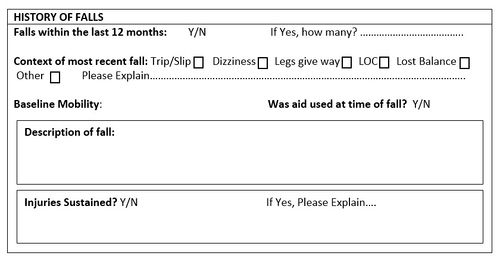The Ultimate Guide To Dementia Fall Risk
Table of ContentsNot known Incorrect Statements About Dementia Fall Risk Little Known Questions About Dementia Fall Risk.The 4-Minute Rule for Dementia Fall RiskExamine This Report about Dementia Fall RiskExcitement About Dementia Fall Risk
The FRAT has 3 sections: drop danger condition, danger variable list, and action plan. An Autumn Threat Condition consists of data regarding background of recent drops, medicines, psychological and cognitive standing of the person - Dementia Fall Risk.If the person ratings on a danger factor, the matching number of factors are counted to the individual's autumn danger rating in the box to the far. If a client's fall threat score totals 5 or greater, the person goes to high threat for drops. If the patient ratings only 4 points or reduced, they are still at some danger of dropping, and the registered nurse needs to utilize their ideal scientific evaluation to handle all loss risk elements as part of an alternative care strategy.
These standard methods, generally, help establish a risk-free atmosphere that lowers accidental drops and defines core safety nets for all clients. Signs are vital for clients in jeopardy for falls. Healthcare companies require to recognize that has the condition, for they are accountable for implementing activities to advertise individual security and avoid drops.
Dementia Fall Risk for Dummies
For instance, wristbands should consist of the individual's last and initial name, date of birth, and NHS number in the UK. Details must be printed/written in black against a white background. Only red shade ought to be utilized to indicate special person condition. These recommendations are consistent with existing growths in person identification (Sevdalis et al., 2009).
Products that are as well much might call for the client to reach out or ambulate needlessly and can potentially be a risk or add to drops. Helps prevent the individual from going out of bed with no help. Registered nurses respond to fallers' telephone call lights much more promptly than they do to lights launched by non-fallers.
Aesthetic disability can significantly create drops. Keeping the beds closer to the flooring decreases the risk of drops and major injury. Placing the cushion on the floor dramatically minimizes fall threat in some health care settings.
The Definitive Guide to Dementia Fall Risk
Clients that are tall and with weak leg muscle mass that try to rest on the bed from a standing position are likely to drop onto the bed because it's as well reduced for them to decrease themselves safely. If a high patient attempts to get up from a reduced bed without aid, the client is most likely to drop back down onto the bed or miss out on the bed and fall onto the floor.
They're created to advertise prompt rescue, not to prevent falls from bed. Aside from bed alarms, enhanced supervision for high-risk individuals additionally may assist stop drops.

People with a shuffling gait boost autumn chances significantly. To minimize autumn danger, footwear must be with a little to no heel, slim soles with slip-resistant tread, and sustain the ankle joints. Advise patient to use nonskid socks to stop the feet from moving upon standing. Encourage patients to put on ideal, well-fitting shoesnot nonskid visit here socks for motion.
The Best Strategy To Use For Dementia Fall Risk
In a research, homes with sufficient illumination record fewer falls (Ramulu et al., 2021). Renovation in lighting at home may minimize loss prices in older grownups.

Caretakers are reliable for assuring a protected, secured, and secure setting. Nonetheless, studies demonstrated very low-certainty evidence that caretakers lower loss risk in acute treatment healthcare facilities and only moderate-certainty that options like video clip surveillance can lower sitter usage without boosting autumn threat, recommending that sitters are not as helpful as at first believed (Greely et al., 2020).
The Single Strategy To Use For Dementia Fall Risk

Increased physical fitness decreases the risk for drops and limits injury that is endured when fall takes place. Land and water-based exercise programs might be similarly advantageous on equilibrium and gait and therefore minimize the threat for falls. Water workout may add a positive advantage on read what he said balance and stride for women 65 years and older.
Chair Surge Exercise is a simple sit-to-stand workout that aids enhance the muscular tissues in the thighs and butts and boosts flexibility and self-reliance. The objective is to do Chair Rise exercises without making use of hands as the client comes to be stronger. See resources area for a detailed direction on how to carry out Chair Surge workout.